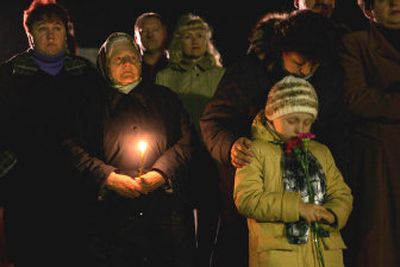Ukrainians commemorate Chernobyl’s 20th anniversary

KIEV, Ukraine – Ukrainian mourners carried single red carnations and flickering candles during a solemn ceremony early today to remember the 1986 Chernobyl explosion, an event that continues to scar this ex-Soviet republic 20 years later.
The April 26, 1986, pre-dawn explosion became the world’s worst nuclear accident, ripping off the nuclear power plant’s roof and spewing radioactive fallout for 10 days over 77,220 square miles of the then-Soviet Union and Europe. It cast a radioactive shadow over the health of millions of people; many believe it also contributed to the eventual collapse of the Soviet Union.
“My friends were dying under my eyes,” said Konstantyn Sokolov, a 68-year-old former Chernobyl worker whose voice was hoarse from throat and lip cancer. Sokolov was among hundreds gathering for a middle of the night ceremony early today in the Ukrainian capital, which President Viktor Yushchenko attended.
In Kiev, bells tolled 20 times starting at 1:23 a.m., marking the time of the explosion at Reactor No. 4 at the Chernobyl nuclear power station. Orthodox priests led the mourners in a somber procession.
Closer to Chernobyl in Slavutych – the town built to house Chernobyl workers displaced in the accident – the commemorations began an hour earlier to coincide with Moscow time, which was used in the then-Soviet Republic of Ukraine at the time of the accident.
Residents laid flowers and placed candles at a monument dedicated to Chernobyl as sirens blared.
Death tolls connected to the blast remain hotly debated, as do the long-term health effects.
At least 31 people died as a direct result of trying to keep the fire from spreading to the plant’s three other operating reactors.
Thousands have been diagnosed with thyroid cancer, one of the only internationally accepted illnesses linked to Chernobyl, and the U.N. health agency said about 9,300 people were likely to die of cancers caused by radiation.